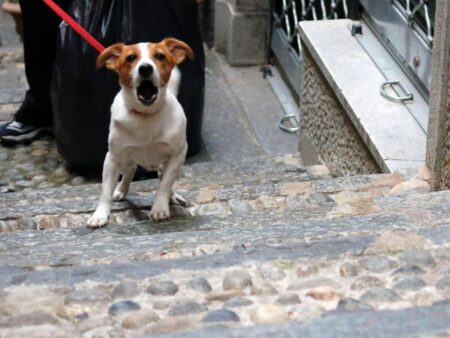
Why Is My Dog Barking at Guests and How to Stop It?
When your dog barks at guests, it can be both embarrassing and frustrating. While barking is normal for dogs, it can be problematic if it becomes excessive or aggressive so, understanding why your dog is barking at guests is the key to addressing this issue effectively.
There can be several reasons why your dog may be barking at guests: fear, territoriality, excitement, or a combination of these factors. That is why once you identify the root cause, you should begin to work on training your dog to stop barking at guests or teach the dog quiet commands.
SEE ALSO: 7 Reasons Why Dogs Don’t Like Their Paws Touched
Why Is My Dog Barking at Guests?
- Fear or anxiety
- Territoriality
- Lack of socialization
- Excitement
- Lack of exercise
- Protection
- Noise
- Previous bad experiences
- Breed or personality
- Medical problems
1. Fear or anxiety
Fear or anxiety can be a major factor in why your dog barks at guests. Dogs that are scared or anxious may bark as a way of signaling that they are uncomfortable or feel threatened by the presence of unfamiliar people.
Several factors can contribute to a dog’s fear or anxiety, including:
- Genetics: Some dogs may be genetically predisposed to anxiety or fear.
- Past experiences: If your dog has had negative experiences with unfamiliar people in the past, such as being scared by a loud noise or being hurt by someone, they may associate guests with these experiences.
2. Territoriality
Territoriality is another potential reason why your dog may be barking at guests. Dogs are naturally territorial creatures, and they may view their home as their domain. When unfamiliar people enter that space, they may feel the need to defend it by barking and acting aggressively.
Here is a factor that can contribute to a dog’s territorial behavior:
- Past experiences: If your dog has had experiences where guests have been aggressive or disruptive, they may associate guests with negative experiences and react with territorial barking.
3. Lack of socialization
Lack of socialization is a critical factor that can cause dogs to bark at guests. Socialization refers to the process of exposing your dog to different people, places, and situations during their puppyhood, which helps them become comfortable and confident in new environments.
If a dog is not properly socialized, they may develop fears or anxieties when faced with unfamiliar people or situations, which can cause them to bark or act aggressively toward guests.
Here are a few signs that your dog may be poorly socialized:
- Fearful or reactive behavior when meeting new people
- Biting or nipping when uncomfortable or scared
- Barking or growling when approached by unfamiliar people
- Difficulty adapting to new environments or situations
- Lack of interest in playing with other dogs
Socialization is a crucial part of a dog’s development and should begin as early as possible. By exposing your puppy to different people, animals, and environments, you can help them become comfortable and confident in any situation, which can reduce the likelihood of barking or other negative behaviors when guests come over.
4. Excitement
Excitement is another potential reason why your dog may be barking at guests. Some dogs become overly excited when they see or hear unfamiliar people, and they may start barking or jumping up as a way of expressing their excitement.
The following factors can contribute to excitement barking:
- Attention-seeking behavior: Dogs that are used to getting attention when they bark or jump up may continue to do so, even when guests arrive.
- Lack of mental stimulation: Dogs that don’t get enough mental stimulation through activities like training or play may be more likely to bark out of boredom or pent-up energy.
5. Lack of exercise
Lack of exercise is a common reason why dogs may bark excessively at guests. Without enough physical and mental stimulation, dogs can become restless, frustrated, and even aggressive.
When dogs don’t get enough exercise, they can become overexcited and have difficulty controlling their behavior. This can lead to excessive barking, jumping, or other unwanted behaviors when guests come over.
6. Protection
Protection is an instinct for many dogs, and they may bark at guests as a way of protecting their owners or their territory. This behavior can be triggered by a variety of factors:
- Perceived threats: Dogs may perceive unfamiliar people as potential threats to themselves or their owners, and will bark or act aggressively to deter them.
- Dominance: Some dogs may try to establish dominance over guests by barking or growling, especially if they perceive the guests as intruders or challengers.
7. Noise
Noise can be a major factor in why dogs bark at guests. Dogs have highly sensitive hearing and can become easily overstimulated by loud noises or unfamiliar voices.
The following factors can contribute to noise-related barking:
- High-pitched or loud voices: Guests who have high-pitched or loud voices may trigger a dog’s instinct to bark, especially if the dog perceives the noise as a threat.
- Crowded spaces: Dogs may become anxious or reactive in crowded spaces where there are a lot of unfamiliar people, and may start barking to try to calm themselves down or signal their discomfort.
8. Previous bad experiences
Previous bad experiences can play a significant role in why dogs bark at guests. If a dog has had a negative experience with a guest in the past, it may associate that guest with a threat or danger and react by barking or acting aggressively.
For example, if a guest has accidentally stepped on a dog’s tail or yelled at them, the dog may develop a negative association with that guest and bark or growl when they come over again.
Here are a few common examples of bad experiences that may cause dogs to bark at guests:
- Guests who have teased or harassed the dog
- Guests who have accidentally injured the dog
- Guests who have brought other animals into the home that the dog perceives as threatening
- Guests who have behaved aggressively or unpredictably around the dog
9. Breed or personality
Breed or personality can certainly contribute to why some dogs bark at guests. Some breeds of dogs have been bred for specific traits like guarding or protecting their owners, which can lead to excessive barking when strangers enter their territory.
Some breeds are also known for being particularly territorial or protective including German Shepherds, Doberman Pinschers, Rottweilers, and Chihuahuas. These breeds may be more likely to bark at guests, especially if they haven’t been properly socialized or trained.
Aside from all these, individual personality traits can also play a role in a dog’s tendency to bark at guests.
10. Medical problems
Medical problems can indeed cause a dog to bark excessively at guests and these health issues can lead to changes in a dog’s behavior like aggression or excessive barking. So, it’s important to consider medical issues as a potential cause if your dog’s barking behavior seems out of character.
Here are a few medical problems that can cause dogs to bark at guests:
- Hearing loss: Dogs with hearing loss may become more anxious or reactive to unfamiliar sounds, such as the voices of guests.
- Cognitive decline: As dogs age, they can develop cognitive decline, which can lead to changes in behavior, including increased barking.
- Pain: If a dog is experiencing pain or discomfort, they may become more aggressive or reactive, including barking at guests.
- Brain tumors or seizures: These conditions can cause changes in a dog’s behavior and may cause them to bark excessively at guests.
How to Stop Your Dog From Barking at Guests
- Positive reinforcement
- Counter-conditioning
- Exercise
- Management
- Professional help
1. Positive reinforcement
Positive reinforcement is a powerful tool for teaching your dog how to behave around guests so, by rewarding your dog for good behavior, you can effectively change their behavior over time.
Here’s how positive reinforcement works:
- Identify the desired behavior: In this case, the desired behavior is for your dog to be calm and quiet around guests.
- Reward the desired behavior: When your dog remains calm and quiet around guests, reward them with a treat or praise.
- Repeat: The more your dog is rewarded for the desired behavior, the more likely they are to repeat it in the future.
2. Counter-conditioning
Counter-conditioning is a behavior modification technique that involves replacing a negative response with a positive one. It’s particularly useful for dogs that bark at guests out of fear or anxiety.
Here’s how counter-conditioning works:
- Identify the trigger: In this case, the trigger is the presence of guests in your home.
- Pair the trigger with positive reinforcement: Gradually expose your dog to the presence of guests while giving them treats, praise, or their favorite toys.
3. Exercise
Exercise is a powerful tool for reducing your dog’s excess energy and anxiety which can be major contributors to excessive barking. So, exercising your dog before a guest arrives can help reduce their stress and make them less likely to bark.
Here’s how exercise can help:
- Tire them out: A long walk, a game of fetch, or a trip to the dog park can help tire out your dog before guests arrive, reducing their energy level and making them less likely to bark.
- Reduce anxiety: Exercise can also help reduce anxiety in dogs by releasing endorphins, which have a calming effect.
4. Management
Management involves using tools or techniques to prevent your dog from engaging in unwanted behaviors, such as barking at guests. While management techniques should be used under the guidance of a professional trainer, they can be effective in preventing your dog from barking at guests.
Here are a few management techniques that can help:
- Muzzle: A basket muzzle can prevent your dog from barking while still allowing them to pant and drink water. Muzzles should only be used for short periods and should be fitted properly.
- Crate: Putting your dog in a crate or in another room when guests arrive can prevent them from barking. This technique should be used sparingly and should never be used as a punishment.
- Baby gate: A baby gate can be used to create a barrier between your dog and guests, which can reduce barking.
- Distractions: Providing your dog with toys, chew bones, or other distractions when guests arrive can help keep them calm and prevent them from barking.
SEE ALSO: Dog Makes Grunting Noises When Sleeping: Causes and Solutions
5. Professional help
If your dog’s barking at guests is severe or you’re unsure of how to address the issue, professional help can be a valuable resource because a professional dog trainer or behaviorist can help you identify the root cause of the barking and develop a personalized plan to address it.
Here’s how professional help can help:
- Expertise: Professional trainers have years of experience dealing with barking and other behavioral issues in dogs, and can provide you with expert advice and guidance.
- Individualized approach: A professional trainer can develop a training plan that is tailored to your dog’s specific needs and personality, helping to address the underlying cause of the barking.
- Professional training techniques: Dog trainers have access to a range of techniques and tools, such as clicker training, positive reinforcement, and behavioral modification, that can be effective in addressing barking.
- Consistency: A professional trainer can help ensure that you and your dog are consistently applying the training techniques, which is critical for success.


